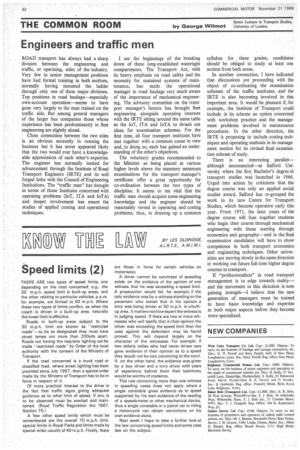THE COMMON ROOM
Page 64

If you've noticed an error in this article please click here to report it so we can fix it.
Senior Lecturer in Transport Studies, by George Wilmot university of London.
Engineers and traffic men
ROAD transport has always had a sharp division between the engineering and traffic, or operating, sides of the industry. Very few in senior management positions have had formal training in both sections, normally having mounted the ladder through only one of these major divisions. Top positions in road haulage—especially own-account operation—seems to have gone very largely to the man trained on the traffic side. But among general managers of the larger bus companies those whose experience has been predominantly in fleet engineering are slightly ahead.
Close connection between the two sides is an obvious necessity in running the business but it has never appeared likely that the two would ever have a knowledgeable appreciation of each other's expertise. The engineer has normally looked for advancement through the Institute of Road Transport Engineers (IRTE) and its well forged links with the Council of Engineering Institutions. The "traffic man" has thought in terms of those Institutes concerned with operating problems (IoT, ITA and IoTA) and deeper involvement has meant the studies of applied costing and operational techniques. I see the beginnings of the breaking down of these long-established watertight compartments. The Transport Act, with its heavy emphasis on road safety and the necessity for sustained systems of maintenance, has made the operational manager in road haulage very much aware of the importance of mechanical engineering. The advisory committee on the transport manager's licence has brought fleet engineering alongside operating interests with the IRTE sitting around the same table as the IoT, ITA and IoTA to thrash out ideas for examination schemes. For the first time, all four transport institutes have met together with a common cause in view and, in doing so, each has gained an understanding of the other's objectives.
The voluntary grades recommended to the Minister as being placed at various higher levels above the statutory minimum examinations for the transport manager's certificate offer a great opportunity for co-ordination between the two types of discipline. It seems to me vital that the traffic man should acquire some engineering knowledge and the engineer should be reasonably versed in operating and costing problems; thus, in drawing up a common syllabus for these grades, candidates should be obliged to study at least one section from both areas.
In another connection, I have indicated that discussions are proceeding with the object of co-ordinating the examination schemes of the traffic institutes, and the IRTE is also becoming involved in this important area. It would be pleasant if, for example, the Institute of Transport could include in its scheme an option concerned with workshop practice and the management problems involved in maintenance procedures. In the other direction, the IRTE is proposing to include costing techniques and operating methods in its management section for its revised final examination scheme of study.
There is an interesting parallel— although unconnected—at Salford University where the first Bachelor's degree in transport studies was launched in 1966. Urged into action by criticisms that the degree course was only an applied social studies award, Salford has re-grouped the work in its new Centre for Transport Studies, which became operative early this year. From 1971, the later years of the degree course will fuse together students who begin their course through mechanical engineering with those starting through economics and geography—and in the final examination candidates will have to show competence in both transport economics and engineering techniques. Other universities are moving slowly in the same direction in working out future full-time higher degree courses in transport.
If "professionalism" in road transport management is to edge towards reality— and the movement in this direction is now gaining strength—I believe that the new generation of managers must be trained to have basic knowledge and expertise in both major aspects before they become more specialized.




































































































